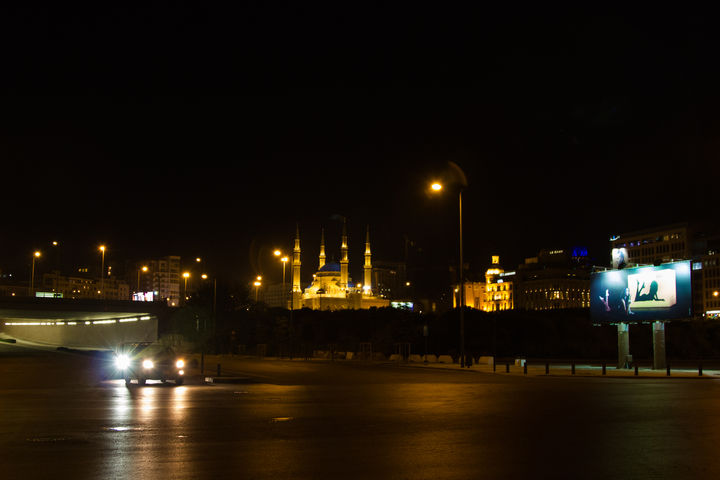Beirut by night
Beirut, Lebanon
The friendly, rambling flophouse of a hotel where I spend my first night occupies three or four floors of a nondescript apartment building located down a dark sidestreet opening off a utilitarian highway above the port. But if I walk just a little way along the Rue du Port, past a row of half-completed shops, I quickly find myself in a different world.
Here, well-groomed blond buildings tower above immaculate pedestrianized streets, the lofty windows of the shops on their ground floors revealing an Aladdin's cave of designer goods. The place fairly glows with money. A little further on, a modern mosque basks in the glare of floodlights. For a reason that escapes me, one side of the mosque is flanked by a kind of large tent filled with gigantic headshots of Rafik Hariri, beaming genially at passers-by over an irreproachably Lebanese mustache.
By the port, the shopping streets are mostly empty, but just a little further inland the sidewalk cafes begin, filled with a chicly-dressed crowd of men and women of all ages. The air is dense with the smell of flavored tobacco; every second person seems to be pulling at a nargileh. The holiday atmosphere is completed by the presence of a scattering of small children, looking much more bright-eyed and awake than I am, although at quarter past eleven it's probably well past their bedtime too.
The one incongruous note is that each of these elegant streets is closed at either end by red and white barriers of various designs, manned by heterogeneously-equipped soldiers in baggy camouflage suits and berets. Later, I see photographs of these same elegant streets as they looked during the Civil War, flanked by bullet-scarred buildings and choked with rubble and makeshift barricades, and the precaution seems more understandable.
I turn my back on the bright lights and walk back down the Rue du Port. Even here, conspicuous consumption is hard to escape: the quiet of the night is blasted at intervals by the roar of high-powered engines, as the Beirutis show off what money can get you on two or four wheels. The emphasis seems to be on volume: luxury cars in the US announce themselves with a discreet and throaty rumble, but in Beirut they pass you with an ear-battering jet-fighter howl that rings in your ears long after the source has dwindled to a pair of fading red brakelights in the darkness beyond the port.
